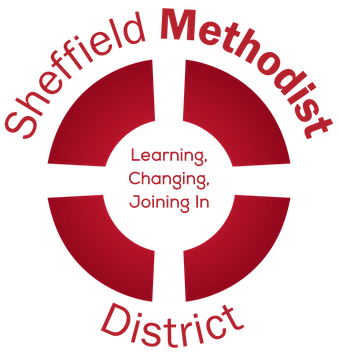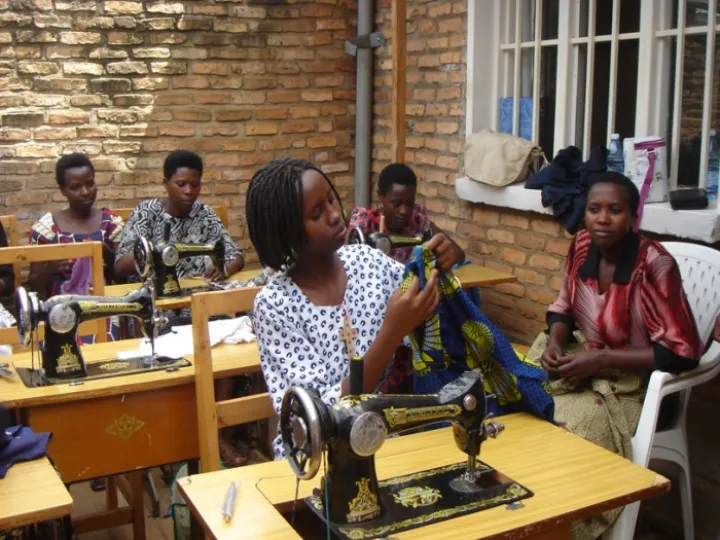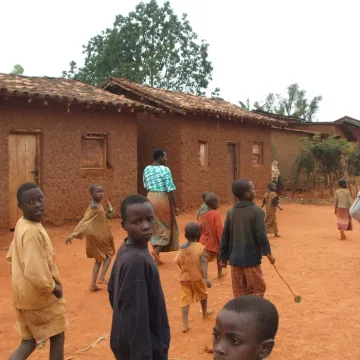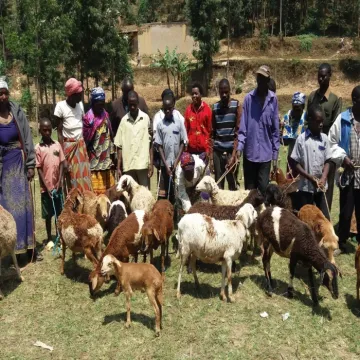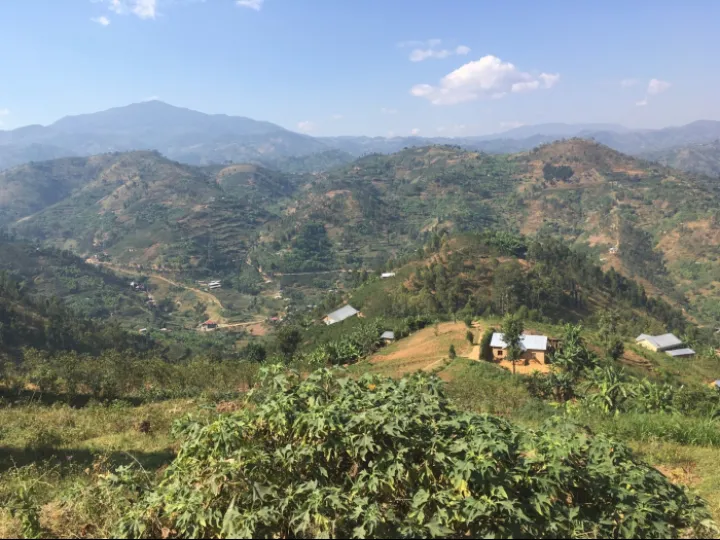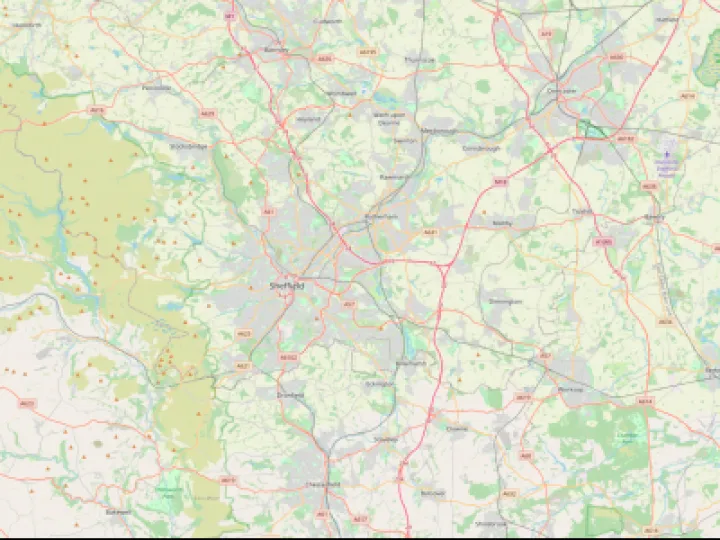THE GOBOKA RWANDA TRUST
My name is Heather Thomas, and I will be known to some of you as a Member of Bakewell Methodist Church, a Circuit Steward and a representative on some District Committees.
In 2008 I was given the opportunity to visit Rwanda as a Youth Leader with a group of young people from the Wolverhampton & Shrewsbury District of the Methodist Church – and upon my return decided that I wanted to do more to help the lovely people that I had met. My background was in public relations and event management – and I felt sure I had the skills to do something which would be beneficial to people who led very different lives to our own.
My Church supported me in a year's fundraising after that first visit – we raised £8,000 and so started, for me, a life-changing journey when I was in my late 50s and looking towards a quiet retirement!
Rwanda is a small country (10,000 square miles – about the size of Wales) and right on the Equator. It is a beautiful country – very much like the Peak District, but it has a population just approaching 13 million, and only a small percentage have regular access to running water and electricity. At one time it was the second poorest country in the world, but now has a fast growing economy and has improved its status – although still people in the more rural areas have very little and are in great need.
In 2009 I set up The Goboka Rwanda Trust (Goboka being a Kinyarwanda word and meaning 'to help and support') – which is a Registered UK Charity. Kinyarwanda is the common language in Rwanda, but since 2010 English took over from French as being their second language.
I had learned several things from that first visit – that a little money can go a long way if placed in the right hands of trusted partners – and that the people who know best what is needed in countries like Rwanda, are those living there. So the Trust has a simple strategy – we have a bank account in this country and one in Rwanda. We hold fund-raising events here – and work with two organisations in Rwanda – The Free Methodist Church and PHARP (Peace-building, Healing & Reconciliation Programmes) – where my partners identify suitable projects for us to support which have a high level of impact and make a measurable difference to the lives of ordinary Rwandans, and which make a contribution to the country's drive for a brighter and more enterprising future for all. Once a project has been identified, the funding is made available and our partners in Rwanda supervise it coming to fruition. All our projects are self-sustaining – and our mantra is that we give a 'hand-up' not a 'hand-out.'
So, we have a wide range of projects. We currently have three Health Posts (similar to GP surgeries in this country) which the Trust has built but the Government staff and run. All are in very rural locations but with links to larger medical facilities – and they offer services which were previously not available. In 2019 we opened the first Reconciliation Centre in Rwanda – where services are offered to all in Health Education, Agriculture and well as being a large meeting place for Conferences. Graduations, Reconciliation events,etc. We run apprenticeship schemes to support the youth – sewing schools – carpentry – bee-keeping – welding – electrical – and endeavour to give graduates who show potential a sewing machine, or tools and equipment so that they have a skill and job for life.
In some of the poorest areas of the country we give livestock so that people can breed with the animals and then sell offspring, or have milk from goats and sheep and cows. Some schools have goats and cows which are able to feed the undernourished pupils – but also through breeding programmes can assist the schools in buying resources which were not previously available or possible.
To support some of our projects we sell gift cards – which vary from £10 – £300 – covering Health Insurance for a family, 4 chickens & a cockerel, a contribution to our bee projects, a pig, a contribution to one of our apprenticeship schemes, a sheep, a goat, a sewing machine – right up to a cow.
Over the years I have visited Rwanda a number of times to see how our many projects are working and show our continuing support to those who have benefited from them. But our work is also educational in this country – as I go into schools – and to many groups like WIs, Rotary, Probus etc around this area and beyond – giving talks and showing slides of the work we have been able to do and how it has benefited others whose lives are very different to our own. I also sell beautiful hand-made goods – bags, aprons, giraffe and elephant which I buy from our sewing schools and then sell here, together with our Gift Cards, so that the money raised can be put back into the 'pot'.
Of course, work such as ours is not possible without the help of many other people. In 2018 I was awarded a BEM for my work both in Rwanda and in my local community – but this is very much a shared Award – with the many people who help our charity in a variety of ways – both here and in Rwanda. Myself and my Treasurer may be the only people who take on the day-to-day running – but we have a small group of Trustees and helpers – some who cover our social media and website, and others who always turn up to assist at fund-raising events – or who donate on a regular basis. No-one in our Charity is paid – neither here or in Rwanda – all work is done voluntarily – and I believe this leads to the popularity of the charity and the willingness by so many to support us, as they know that every penny raised goes to help the people of Rwanda.
Let me give you an example of the advantage of working with people in a country where they identify things we would totally miss! In 2017 I was taken to meet a group of largely elderly ladies. This was a Reconciliation Group who met fortnightly for basket-making. My partner who started this group told me that some of the women were wives of men who had killed the husbands of others during the Genocide. When they were first brought together, it had been very difficult – some sat at one side of the room and others as far away as possible – but in time they began to realise that as women, they had many things in common – and through the work that PHARP is able to do they realised that reconciliation is the only way forward for themselves and a country which has experienced such horror. In 1994, over 800,000 people were murdered during the 100 days of the Genocide.
I didn't know when I visited this group, but during a previous period I had sold 17 goat cards. This meant that these women had each received a goat – which enabled them to breed with others, have enough milk for themselves – and sell any surplus. These women had been widowed for many years and had no dependent children or relatives to look after them, so this was a really important step up for them. As the group continued to meet, the women started to bring a small financial contribution each time they met – and when I visited, they had £150 in a Co-operative Bank Account – which was held for if any of them had a particular need. Some gave their testimony and said that PHARP had given them a new lease of life – but also a new perspective on how important reconciliation is. We, as a charity, would never have thought of giving goats in this way – but by working with partners who know and understand their culture, we had been able to help those widows and many other groups. This, of course, is how God works! He uses those of us who are able to enhance His kingdom amongst those faithful people across our world who have a need.
Although our work is primarily amongst poor communities – so that the very young to the very old get some benefit from our projects, I have occasionally been approached by people who might want, for example, to educate someone, as their backgrounds have been in teaching. One such couple supported a young man who was an orphan of the genocide, then working as an unqualified teacher in a secondary school. Our partners in Rwanda identified him as a bright young man but who would not be able to educate himself because of lack of funding, and who would eventually be out of work as the country progressed and qualifications became of importance – as here.
This couple supported this young man through University in Uganda where he took a degree in Computer Science (there were few courses available in Rwanda at the time). The funding they offered we invested, and at the end of his degree, there was enough for him to study for an MA – which he did. Ephrem is now in his late 30s and a Lecturer at the University of Kigali – but each summer he returns to the school he was a teacher and runs a computer school for other students to learn some of the basics. He has always been in constant touch with his sponsors – sending exam results – and communicating with them about his life (and now family) – and his sponsors have been out to Rwanda with me to meet him in person. As a small charity, this is the sort of thing we can do. We do not wish to expand in any way that means we lose that personal touch with all those we work with – for that is of vital importance to us.
On the strength of that relationship, that same couple are now sponsoring a young girl through her education and have done so since she finished her free schooling at the age of 15. Their daughter travelled with me one year to meet the girl – Vestine – and her family. She is currently at University – a very bright student with an exciting future ahead – but from a very poor family who would not have been able to afford further education for her.
My couple in the UK say their lives have been changed by these two relationships – and without a doubt, those who are benefiting from their generosity would certainly say the same!
In September my Treasurer and I are heading back to Rwanda. I have not visited since Christmas 2019 – partly because of Covid – partly because I had to undergo surgery – but also because I am much more aware of the need for us to consider our carbon footprints on the environment through travel – and ensure that, as a charity, we do our bit to help. We have always funded the planting of trees to offset our carbon footprint when we travelled – and we shall continue to do that. However, I am also mindful that there is also a need to show the people of Rwanda that we have not forgotten them and are interested to see the progress they make through our projects – so occasional visits are still important. tt is an exciting time for us – and for our friends out there who are waiting to greet us – and I know it will be a wonderful few weeks!
We always come back feeling inspired to carry on and uplifted by the wonderful people we meet. Those who have travelled with us over the years – whether of the faith or not – always remark on the worships we attend – where many hundreds of people come together to sing, dance and to praise. They may have so little – but their faith is admirable – and Sunday worship is often the highlight of their week and can last several hours – although it never seems that way! And through the friends I have made I have been to weddings, baptism and many graduations of the students we have supported over the years. Yes, many lives have been changed – not least of all mine!
I hope what I have shared may be of interest – and if you would like to know more – please do visit our website at www.thegobokarwandatrust.co.uk – which has further details about our work over the years and currently.
If your Church – or any groups to which you belong as individuals – might be interested in an illustrated talk please do get in touch. Talks can vary between 30 minutes and one hour – and if you wish, I could bring goods which you might like to purchase to further help the work we do. I ask only for a donation – and all funds go to the Trust.
I am so aware that if we are open to listen to God, we find we have talents which we never really thought about – and I believe mine was the ability to speak and to share about this beautiful little country where God led me to meet its people – people who had experienced true horror in their past – but with just a little help, are now working towards a brighter and better future.
Thank you for allowing me the time to share some of my story.
Blessings
Heather Thomas, BEM
Chief Officer – The Goboka Rwanda Trust
Quick Links
Registered Charity no. 1129363
Get In Touch
admin@sheffieldmethodist.org
0114 270 9990 / 0114 430 0255
Sheffield District Office
Room 47, Victoria Hall Methodist Church
Norfolk Street
Sheffield
S1 2JB
